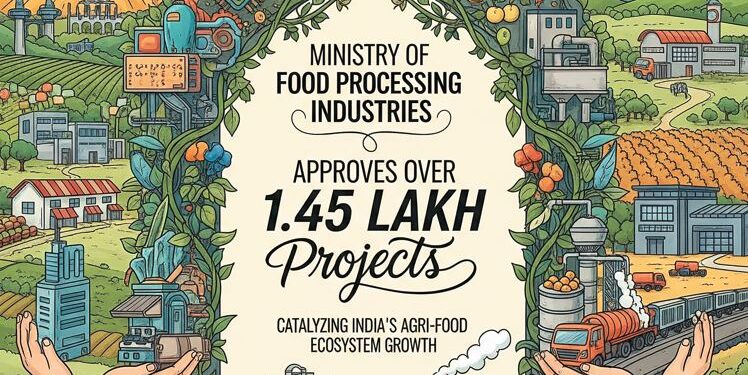-KH News Desk (cbedit@imaws.org)
In a landmark announcement, the Ministry of Food Processing Industries (MoFPI) has confirmed the approval of over 145,821 food processing projects across India, a transformative move expected to dramatically improve the country’s agricultural value chain. These projects fall under flagship government schemes, including the Pradhan Mantri Kisan SAMPADA Yojana (PMKSY), Production Linked Incentive Scheme for Food Processing Industry (PLISFPI), and the Pradhan Mantri Formalization of Micro Food Processing Enterprises (PMFME).
The effort is part of a broader government vision to realise “Viksit Bharat” (Developed India) through sustained rural development, infrastructure creation, and value-added agriculture. The scale of the initiative not only strengthens India’s food processing capacity but also lays the groundwork for rural entrepreneurship and sustainable growth across the agri-food sector.
Strategic Government Vision for Sectoral Transformation
The announcement signals a multi-pronged and well-coordinated approach to national food infrastructure development. Each scheme within the MoFPI portfolio serves a unique and complementary purpose:
- PMKSY: Sanctioned 1,134 projects, including 41 Mega Food Parks and 395 Cold Chain projects, focused on improving supply chain logistics, storage, and processing.
- PLISFPI: Approved 170 proposals with a budget allocation of ₹10,900 crores over six years, aiming to create global food manufacturing champions and incentivize large-scale investment.
- PMFME: With a staggering 144,517 proposals approved, this scheme directly targets micro and small enterprises, most of which are located in rural India, and provides subsidies, capacity building, and technology access to bring informal units into the formal economy.
Together, these schemes demonstrate the government’s commitment to systematically build India’s food processing capabilities, modernize storage and transportation networks, reduce food waste, and foster inclusive economic development.
Tangible Rural Impact: Empowering Farmers and Micro-Enterprises
A key goal of these initiatives is to empower rural populations, particularly farmers, by enabling value addition at the grassroots level. This is crucial in a country where a significant portion of agricultural produce is lost post-harvest due to inadequate infrastructure. These losses not only hurt farmers’ incomes but also affect national food security and inflation.
The PMFME scheme, for instance, is geared toward empowering individual entrepreneurs and self-help groups (SHGs). It offers both capital subsidies and technical support, enabling micro-enterprises to upgrade operations, access better markets, and maintain quality standards.
A real-world example of this strategy at work can be seen in Kushinagar, Uttar Pradesh, where 261 projects have been sanctioned under PMFME. The district, part of the Banana Cluster under Operation Greens and the ODOP (One District One Product) initiative, has emerged as a processing hub for banana-based products. Farmers are now able to diversify output and sell value-added goods like banana chips, purées, and powders.
Similarly, in Karnataka, the state has announced the establishment of 6,000 food processing units, with subsidies of up to ₹15 lakh per unit (₹9 lakh from the state, ₹6 lakh from the Centre). Mandya district is one of the frontrunners in terms of loan disbursals and subsidy implementation under PMFME.
These measures are helping turn farmers into agri-entrepreneurs, supporting women-led businesses, and generating employment at the local level, all while enhancing farm-level income stability.
Private Sector and FDI Participation Encouraged
With infrastructure and financial risk significantly reduced through government backing, the Indian food processing sector is becoming an attractive destination for private and foreign investors. From Mega Food Parks to Cold Chains, these projects offer long-term revenue potential.
As of December 2024, the sector had already attracted USD 13.01 billion in Foreign Direct Investment (FDI) since April 2000. Continued government emphasis on sectoral development and ease of doing business will likely accelerate this momentum.
These investments have a multiplier effect—generating rural employment, reducing perishability risks, and improving logistics efficiency, thereby making processed food more accessible and affordable for consumers.
Boosting Export Competitiveness with Quality and Standardisation
Another important facet of the government’s approach is the formalisation of the micro food processing sector, which has long operated in the informal economy with limited access to finance, technology, or export markets. Through PMFME, these units now receive:
- Technical and quality training
- Food safety and hygiene workshops
- Support for certification and packaging
This transformation is critical as processed foods made up 23.4% of India’s agri-food exports in 2023–24. Global markets increasingly demand traceability, consistency, and clean-label standards. By improving quality at the grassroots level, India can expand its export footprint and enhance its reputation in international food supply chains.
A Vision for Viksit Bharat through Food Sector Modernisation
At its core, this government initiative is about transforming agriculture from a subsistence sector to a growth engine. By improving infrastructure, formalising enterprises, encouraging private investment, and providing direct financial support, the Ministry of Food Processing Industries is building a resilient, efficient, and equitable food economy.
The approval of over 1.45 lakh projects is not only a testament to the government’s commitment to agri-sector reform but also a blueprint for inclusive rural growth. If implemented effectively, these schemes could reshape India’s food landscape, bringing better livelihoods to farmers, more nutritious products to consumers, and greater competitiveness to Indian agribusinesses on the world stage.







